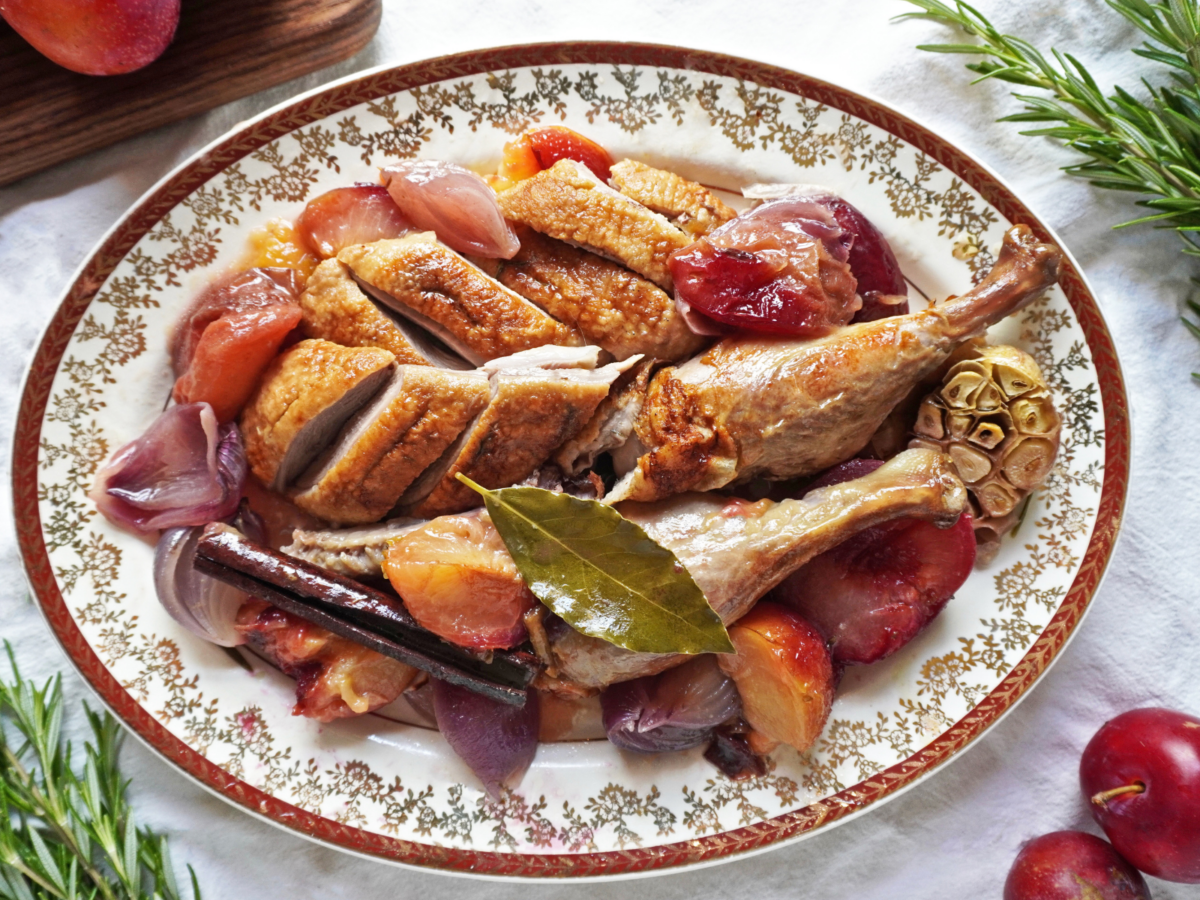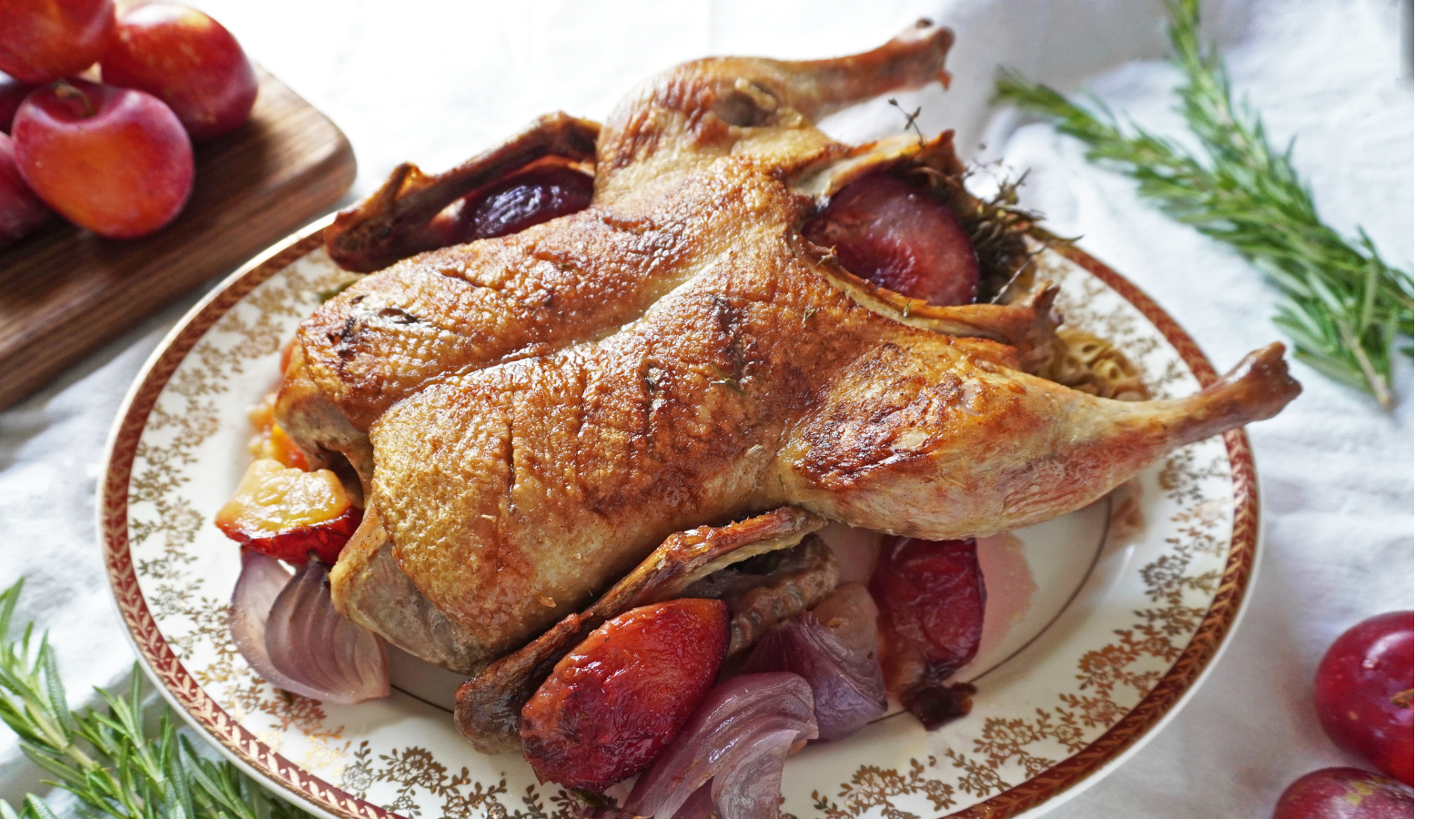My grandmother typically hosted Rosh Hashanah dinners along with Yom Kippur break fasts, and it was her tradition to make a multi-course meal that often included duck as the main entrée. She prepared her duck simply: roasted and surrounded by aromatics and prunes. The inky sweetness of dark plums enhanced the earthy richness of the bird. Duck was a special occasion food, and as an immigrant from Ukraine, she was likely inspired by the old world Eastern European Jewish tradition of eating whole goose for the holidays.
For me, duck remains a celebratory dish. It may be pricier per pound than some other types of proteins, and it can be a bit more difficult to source, but it is also decadently rich, and a small portion can go a long way. kosher duck can be ordered online or often procured from a kosher butcher shop. Whole ducks can be purchased at most Asian markets, or you can ask your local grocery store butcher whether they can special order a duck for you.

For this recipe, it’s best to use a whole duck, as the preparation is rustic and simple. Instead of prunes I love to use fresh plums, which add both sweetness and bright acidity to the dish. Adding a little orange juice to the cooking liquid helps add to the fruity and tart flavors. Including a cinnamon stick with the braiding liquid is optional, but if added it will bring warmth and complexity to the duck. Once roasted, the duck bones have tons of flavor, and I use them to make a delicious stock — no part of the valuable duck gets wasted. Duck is best prepared the day you intend to serve it, and will complement any festive spread with brisket, chicken or other classic High Holiday foods like tzimmes, kugel and more.
The Nosher celebrates the traditions and recipes that have brought Jews together for centuries. Donate today to keep The Nosher's stories and recipes accessible to all.
Ingredients
- 1 (5-6 lb) whole duck
- 6 plums (1½ lbs / 708 g) plums, about 6, pitted and halved
- 4 small red onions (1 lb / 500 g) red onions, quartered
- 6 sprigs fresh thyme
- 4 sprigs rosemary
- 2 bay leaves
- 1 head of garlic, halved horizontally
- 1 cinnamon stick (optional)
- 1½ cups chicken stock or water
- ½ cup orange juice
- salt and pepper, to taste
Directions
- Preheat the oven to 350°F.
- Trim any excess fat off of the duck, pat it dry, and generously season the inside and outside with salt and pepper (you can reserve the excess fat and render it for schmaltz). Score the top of the duck breast with vertical slits; this will allow the fat to render out more easily when browned.
- Heat a roasting pan or a large skillet on medium-high heat. Once it is very hot, add the duck breast-side down. Brown the duck for 5-6 minutes, then flip and brown the opposite side for 5-6 minutes. Transfer the duck and reserve; drain any excess fat from the pan.
- To the same roasting pan, or to a large oven-proof baking dish, add the quartered red onions, 2 sticks of rosemary, 2 sprigs of thyme, bay leaves, half of the head of garlic, and the cinnamon stick if using. Add the remaining rosemary, thyme, and half head of garlic to the inside cavity of the duck. Place the duck on top of the onions. Pour the stock and orange juice into the bottom of the pan.
- Roast the duck for 1 hour. After one hour, add the halved plums to the pan; if the bottom of the pan is drying out, you can add more stock, juice, or water. Increase the oven temperature to 425°F, roast for 35-45 more minutes or until the duck is deeply golden brown, the plums are soft but still hold their shape, and the duck meat has an internal temperature of at least 165°F when tested with a meat thermometer.
- Transfer the duck to a serving platter and allow it to rest for at least 15 minutes before serving. Serve whole or sliced, alongside the plums and red onions.
- The cooking liquid will include a fair amount of fat, and depending on your taste you can spoon some of it over the bird, or reserve and refrigerate. Once cooled, you can skim the fat off the top, and strain the remaining liquid to use for stock or soup, and duck bones can also be reserved for stock.



